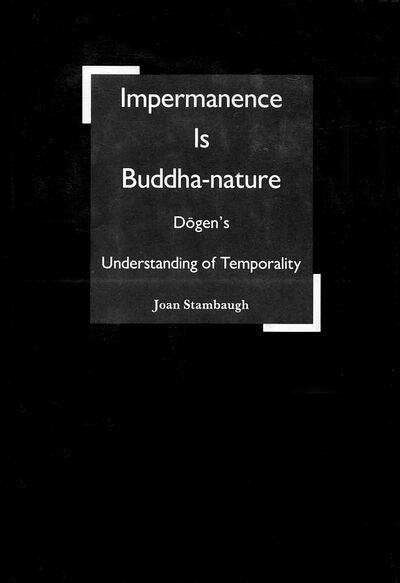- Prefaceix
- 1. Impermanence1
- 2. Buddha-nature18
- 3. Being-time24
- 4. Birth and Death72
- 5. Dialectic78
- 6. Time and eternity94
- 7. Thinking113
- Epilogue130
- Notes133
- References141
- Index145
(Created page with "{{Book |BookParentPage=Secondary Sources |BookPerson={{Book-person |PersonPage=Stambaugh, J. |PersonName=Joan Stambaugh }} |FullTextRead=No |BookToc=* {{i|'''Preface'''|ix}}...") |
No edit summary |
||
| Line 1: | Line 1: | ||
{{Book | {{Book | ||
|BookPerson={{Book-person | |BookPerson={{Book-person | ||
|PersonPage=Stambaugh, J. | |PersonPage=Stambaugh, J. | ||
| Line 21: | Line 20: | ||
|QuotesTabContent={{GetBookQuotes}} | |QuotesTabContent={{GetBookQuotes}} | ||
|PostStatus=Needs Final Review | |PostStatus=Needs Final Review | ||
|BookParentPage=Secondary Sources | |||
}} | }} | ||
Revision as of 11:24, 10 April 2020
Dōgen Zenji was a Japanese Zen Buddhist teacher born in Kyōto, and the founder of the Sōtō school of Zen in Japan after travelling to China and training under the Chinese Caodong lineage there. Dōgen is known for his extensive writing including the Treasury of the Eye of the True Dharma or Shōbōgenzō, a collection of ninety-five fascicles concerning Buddhist practice and enlightenment.
The primary concept underlying Dōgen's Zen practice is “oneness of practice-enlightenment”. In fact, this concept is considered so fundamental to Dōgen's variety of Zen—and, consequently, to the Sōtō school as a whole—that it formed the basis for the work Shushō-gi, which was compiled in 1890 by Takiya Takushō of Eihei-ji and Azegami Baisen of Sōji-ji as an introductory and prescriptive abstract of Dōgen's massive work, the Shōbōgenzō (“Treasury of the Eye of the True Dharma”).
Dōgen is a profoundly original and difficult 13th century Buddhist thinker whose works have begun attracting increasing attention in the West. Admittedly difficult for even the most advanced and sophisticated scholar of Eastern thought, he is bound, initially, to present an almost insurmountable barrier to the Western mind. Yet the task of penetrating that barrier must be undertaken and, in fact, is being carried out by many gifted scholars toiling in the Dōgen vineyard. (Source: University of Hawai'i Press)
| Citation | Stambaugh, Joan. Impermanence Is Buddha-Nature: Dōgen's Understanding of Temporality. Honolulu: University of Hawai'i Press, 1990. |
|---|---|

